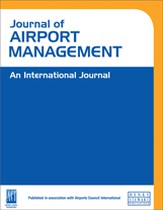The implications of sustainable development for airport duty-free business models
Abstract
This paper considers how the challenges underpinning sustainable development are likely to impact on duty- and tax-free retailing in airports and, by implication, in the entire aviation industry. The paper defines the role of retail as a vital source of airport revenues, before considering the carbon consequences of the sector’s incumbent business models. It finds that products taken onto aircraft increase aircraft weight and fuel burn and are a primary source of carbon emissions for duty-free retailers. The implications for the sector are discussed, and the potential for implementing more sustainable business models is presented. Here it is identified that the specific logistical, economic, and political constraints of operating in the airport make alternative business models difficult, if not impossible to implement. The specialisations that have helped this sector to flourish are constraining their ability to adapt to the climate challenge.
The full article is available to subscribers to the journal.
Author's Biography
Graeme Heyes is a Postdoctoral Research Associate based in the Ecology and Environment Research Centre at Manchester Metropolitan University. Graeme has a background in environmental management and was in an accounting role in the corporate sector before returning to academia to gain a distinction-grade master’s degree in environmental management and his doctorate in the field of sustainable business model innovation and sustainable aviation. Graeme has expertise in a number of fields, not least in the environmental impacts of aviation (specifically carbon and noise), sustainable business model innovation and the circular economy. As well as conducting world-leading research, Graeme also has a passion for science communication and engagement with nonacademic audiences. He has worked with a wide range or corporate clients and is a carbon-literacy trainer and carbon auditor.
Callum Thomas has a degree in zoology, and; his doctorate is in seabird reproductive biology. He carried out postdoc research at Durham University into the wintering gull populations in Northern England before moving to Manchester Airport, where he set up its Bird Control Unit and Environment and Community Relations departments. Callum was then seconded to and later employed at MMU where, working with Professor David Raper, he established the Centre for Aviation Transport and the Environment. His expertise is in bird hazards to aircraft, the sustainable development and environmental impacts of the air transport industry and how these can be addressed to enable the aviation industry to grow and contribute to sustainable regional development.
Paul Hooper holds a Chair in environmental management and sustainability at MMU and has over 20 years of experience researching in the fields of aviation environmental management and corporate environmental and social responsibility. His work with the air transport sector has incorporated studies into aircraft noise respite, noise management strategies and alternative noise communication metrics, and he has participated as an expert panellist at key international conferences (eg ATAG Global Sustainable Aviation Summit, IATA Annual General Meeting). He has also worked extensively with Airports Council International (ACI) to deliver training in environmental management to professionals within the sector.
Cathy Urquhart has published extensively in many information systems journals such as the Journal of Information Technology, the European Journal of Information Systems, Information Systems Journal and many others. She is the author of a well received book on grounded theory, Grounded Theory for Qualitative Research: A Practical Guide, published by Sage in 2013. She is a member of the AIS Special Interest Groups for Global Development (SIGGLOBDEV), Grounded Theory Method (SIGGTM) and the IFIP 9.4 Working Group on the Social Implications of Computers in Developing Countries and IFIP 8.2 Working Group on Information Systems and Organizations. She is a member of the AIS Women’s College and is a past Vice President for Special Interest Groups and Member Services of the Association for Information Systems (AIS), which is the premier organisation for IS academics. Before joining MMU, Cathy worked at various universities in Australia and at the University of Auckland in New Zealand.
